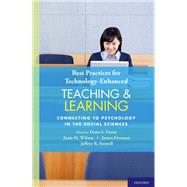
Note: Supplemental materials are not guaranteed with Rental or Used book purchases.
Purchase Benefits
What is included with this book?
| Contributors | p. xvii |
| Getting Connected: An Overview of Best Practices for Using Technology to Improve Teaching and Learning in Psychology | p. 3 |
| Teaching with Technology: Issues and Ideas | |
| Approach or Avoidance? Understanding Technology's Place in Teaching and Learning | p. 17 |
| A Brief Stroll down Random Access Memory Lane: Implications for Teaching with Technology | p. 35 |
| Developing an Online Curriculum in Psychology: Practical Advice from a Departmental Initiative | p. 53 |
| Faculty-Student Communication: Beyond Face to Face | p. 73 |
| Practical PowerPoint: Promising Principles for Developing Individual Practice | p. 87 |
| Technology: Applications In and Outside the Classroom | |
| Comprehensive Hybrid Course Development | p. 107 |
| Academic Advising with a Developmentally Organized Web Site | p. 123 |
| Enhancing Student Engagement and Learning Using ôClickerö-Based Interactive Classroom Demonstrations | p. 137 |
| The What? How? and Which? of Course-Management Systems | p. 155 |
| Interact! Teaching Using an Interactive Whiteboard | p. 171 |
| Motivating Student Engagement with MySpace and Web-Enhanced Research Labs | p. 183 |
| A Practical Guide to Using YouTube in the Classroom | p. 197 |
| I Didn't Know I Could Do That: Using Web-Based Tools to Enhance Learning | p. 207 |
| Think Fast: Using Web-Based Reaction Time Technology to Promote Teaching about Racial Bias and Diversity | p. 223 |
| Technology: New Opportunities for Teaching | |
| Online Tools to Promote Student Collaboration | p. 239 |
| To the Internet and Beyond: Surveying the Active Learning Universe | p. 253 |
| Online Quizzes: Improving Reading Compliance and Student Learning | p. 271 |
| Going Virtual: Virtual Worlds as Educational Tools | p. 283 |
| Emerging Technologies to Improve Teaching and Learning in a Digital World | p. 299 |
| Author Index | p. 317 |
| Subject Index | p. 325 |
| About the Editors | p. 331 |
| Table of Contents provided by Ingram. All Rights Reserved. |
The New copy of this book will include any supplemental materials advertised. Please check the title of the book to determine if it should include any access cards, study guides, lab manuals, CDs, etc.
The Used, Rental and eBook copies of this book are not guaranteed to include any supplemental materials. Typically, only the book itself is included. This is true even if the title states it includes any access cards, study guides, lab manuals, CDs, etc.